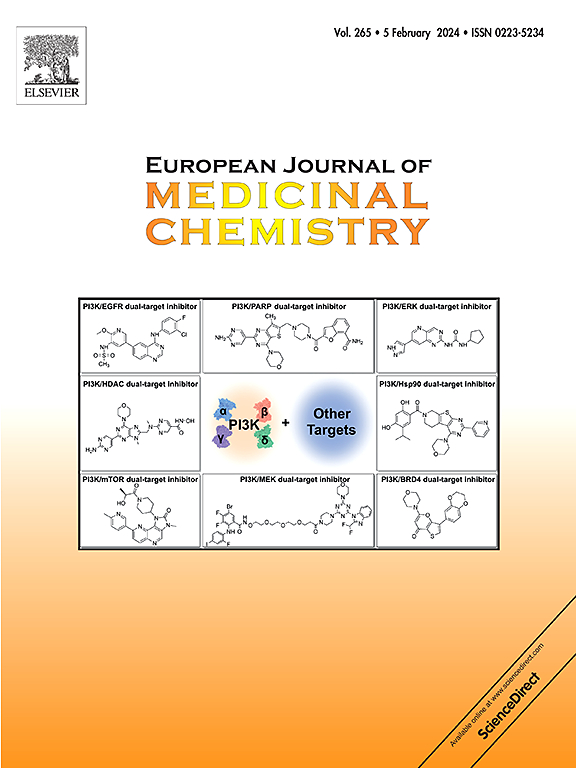Recent advance of KRAS-G12C inhibitors for cancer therapy
IF 6
2区 医学
Q1 CHEMISTRY, MEDICINAL
引用次数: 0
Abstract
The RAS gene family encodes key oncoproteins that play a central role in cellular signal transduction and tumorigenesis. KRAS exhibits the highest mutation frequency in human cancers, accounting for approximately 80 % of RAS-driven malignancies, with the glycine-to-cysteine substitution at codon 12 (G12C) being one of the most prevalent oncogenic variants. RAS proteins regulate downstream signaling pathways by modulating transcription and translation processes, while at the cellular level, they promote malignant phenotypes such as uncontrolled proliferation and metastasis, making them critical therapeutic targets. In 2021, the FDA approved AMG510 (Sotorasib), the first covalent inhibitor targeting the KRAS-G12C mutation. Nevertheless, emerging resistance mechanisms necessitate continuous medicinal chemistry innovations. Currently, many highly KRAS-G12C inhibitors have been approved or are undergoing various clinical stages. This review provides an overview of contemporary medicinal chemistry approaches in KRAS-G12C inhibitor development. The collective insights from this analysis, combined with existing literature, provide valuable frameworks for designing novel KRAS-G12C targeted therapeutics.


KRAS-G12C抑制剂在癌症治疗中的最新进展
RAS基因家族编码在细胞信号转导和肿瘤发生中起核心作用的关键癌蛋白。KRAS在人类癌症中表现出最高的突变频率,约占ras驱动的恶性肿瘤的80%,在密码子12 (G12C)上甘氨酸到半胱氨酸的替换是最普遍的致癌变异之一。RAS蛋白通过调节转录和翻译过程调节下游信号通路,而在细胞水平上,它们促进恶性表型,如不受控制的增殖和转移,使其成为关键的治疗靶点。2021年,FDA批准了AMG510 (Sotorasib),这是第一个针对KRAS-G12C突变的共价抑制剂。然而,新出现的耐药机制需要不断的药物化学创新。目前,许多高KRAS-G12C抑制剂已被批准或处于不同的临床阶段。本文综述了KRAS-G12C抑制剂开发的现代药物化学方法。该分析的集体见解与现有文献相结合,为设计新型KRAS-G12C靶向治疗提供了有价值的框架。
本文章由计算机程序翻译,如有差异,请以英文原文为准。
求助全文
约1分钟内获得全文
求助全文
来源期刊
CiteScore
11.70
自引率
9.00%
发文量
863
审稿时长
29 days
期刊介绍:
The European Journal of Medicinal Chemistry is a global journal that publishes studies on all aspects of medicinal chemistry. It provides a medium for publication of original papers and also welcomes critical review papers.
A typical paper would report on the organic synthesis, characterization and pharmacological evaluation of compounds. Other topics of interest are drug design, QSAR, molecular modeling, drug-receptor interactions, molecular aspects of drug metabolism, prodrug synthesis and drug targeting. The journal expects manuscripts to present the rational for a study, provide insight into the design of compounds or understanding of mechanism, or clarify the targets.

 求助内容:
求助内容: 应助结果提醒方式:
应助结果提醒方式:


